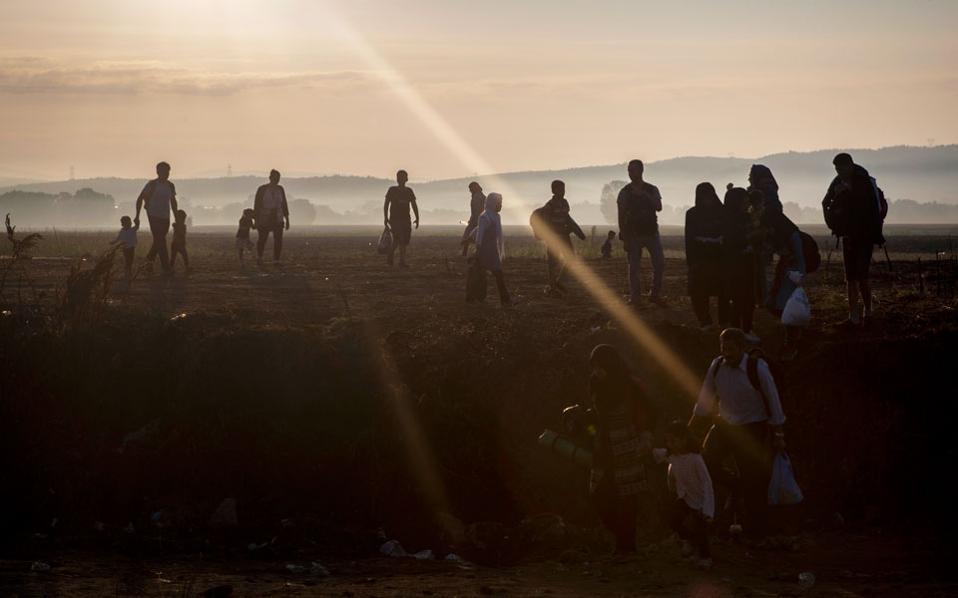Pharmacists and bakers are among businesses worried that the latest Greece rescue deal, while pushing competition, will harm community enterprises

A bakery in Athens. Tax hikes, spending cuts and detailed regulations for retailers are on the horizon for Greece. Photograph: Milos Bicanski/Getty Images
Christos Vouldis doesn’t see why international institutions like the European Central Bank should tell him how to run his bakery. Nikolleta Stefanidi, meanwhile, is worried for the elderly people who come to her Athens neighbourhood pharmacy for their medicine.
Air and sea ports and the national grid are to be privatised as part of Greece’s latest rescue deal under the new three-year bailout. Taxes will be raised on powerful shipping firms, and VAT increased at an estimated cost to the average Greek household of €650 a year.
But among the headline tax hikes, spending cuts and market reforms, there lurk a few oddities.
The shelf-life of milk, for example, or the weight of a loaf of bread, along with rules on what kind of shop may call itself a bakery. Not to mention the sale of un-bottled tsipouro – home-distilled pomace spirit – or who can legally own a pharmacy.
Greece’s creditors – the ECB, International Monetary Fund, the European commission and its ESM bailout fund – have insisted on all these measures as conditions of the bailout. They come from the two so-called OECD toolkits, a raft of 320 or more recommendations made after the Paris-based body spent most of 2013 analysing where Greece’s tangled web of rules and regulations fell short of what it felt was required of a modern economy.
So (in theory) there will be an end to regulations that limit the shelf-life of pasteurised milk in Greece to just five days, against roughly twice that in most of the rest of the EU, making Greek milk up to 30% more expensive.
Out, too, goes the law that said only a place where bakers mixed ingredients, kneaded dough and produced fresh loaves could call itself a bakery and avoid the “bread sales outlet” definition of just selling defrosted and pre-baked loaves.
“The benefit from abolishing the definition would be the enhancement of competition by creating quality differentiations and by offering a broader choice to consumers,” said the OECD, which also wanted bread sold by the kilo rather than, as was the case until very recently, in standard, fixed-weight loaves.
Vouldis, 33, whose bakery was founded 22 years ago by his parents in the southern Athens suburb of Kallithea, and is one of 15,000 local bakeries in Greece, said: “If a supermarket can call itself a bakery and present frozen loaves as fresh, that’s cheating customers . And if we sell by the kilo – which we’ve been supposed to be doing since Easter, actually, but no one does – customers will end up spending more on their bread. Bakers will have far more opportunity to play around with their prices.
“Neighbourhood bakeries are the heart of a community; it’s wrong to make things harder for them than they already are. And it’s unacceptable to have international institutions saying, you’re stupid, you don’t know how to run your business, here’s how you must do it.”
Stefanidi meanwhile was concerned at the bailout powers’ insistence that anyone should be allowed to own a pharmacy: at present, Greek law limits their ownership to pharmacists.
The way the OECD and the international creditors saw it, far too many laws protected Greece’s 11,000 pharmacies – a quantity, per head of the population, about double that for France or Spain, and more than 15 times Denmark’s total.
Many of the rules were scrapped last year despite a European court upholding Greece’s view that it was perfectly entitled to legislate on the matter since its supreme court had ruled that pharmacies were not pure commercial enterprises but also fulfilled a vital social function.
The rule that no district can have more than one pharmacy per 1,000 people will stay. But the regulation stipulating that over-the-counter medicines may only be sold at licensed pharmacies is soon to be scrapped; and the ownership restriction could be gone next week if the bailout package is approved.
“It’s crazy,” said Konstantinos Lourantos, president of the Panhellenic Pharmaceutical Association, in his pharmacy in the Athens suburb of Nea Smyrni. “Anyone will be able to open a pharmacy now. Anyone. In all Europe, only in Slovenia and Hungary is this allowed. Even in Germany, a licensed pharmacist must own at least 51% of a pharmacy.”
The association fears that behind the institutions’ move to liberalise the pharmacy sector, the big drugs multinationals are lying in wait.
“They say they want to open us up to competition, reduce prices, but all that will happen is the big manufacturers will buy up struggling Greek pharmacists and set up their own chains, perhaps favouring their own products,” said Christos Arvantis, the association’s legal counsel. “How is that competition?”
After securing a heavily negotiated third bailout, Greece now faces stringent regulations regarding its financial future imposed by its creditors
Greece’s embattled pharmacies are presently owed an average of about €40,000 each in overdue reimbursements from the country’s cash-strapped health service, Lourantos said. And he denied that Greece’s laws kept drug prices high. “They’re based on an average of the lowest three prices in the EU.”
For Stefanidi, whose small pharmacy is just along the road from Vouldis’s bakery, such arguments were important but not the real issue. “You see, I see my job as providing medicine, not selling products,” she said. “If someone comes in here I won’t sell him something just because it’s nearing its use-by date. I’m a pharmacist, I want it to be the solution. And I’ll make sure it’s safe for him to take in his condition, and with any other drugs he’s taking.”
Above all, though, Stefanidi said, Greek pharmacies were “neighbourhood institutions”. She added: “It’s almost like social work, especially now, with the crisis. If people come in and cannot pay, what am I expected to do? Turn them away?”
She said she was helping five local families, including a couple of older residents, who had little or no income or pension. “And not just with medicines, either,” she said. “Is that protectionism? And how many commercial pharmacy owners, how many supermarkets, would do that?”

![The [Greek] European Tragedy](https://blogger.googleusercontent.com/img/b/R29vZ2xl/AVvXsEiWKI5s90SFm1wWTk6bs4p7CgslaC2SnYPsrZhb-B-smOufNNCSxCvpBLI9hOB-LsXZjir_PNmEiMk2-E62F3xkg96IoC6QFAaZAnPRTVH340IN9WBRmWJqPkjWlgyRj3zpALp7h6hvA58/s920/GkBack_new.jpg)

 Greece's top Supreme Court judge Vassiliki Thanou attends a swearing in ceremony as the country's caretaker prime minister, at the Presidential Palace in Athens, Greece(Alkis Konstantinidis/Reuters)
Greece's top Supreme Court judge Vassiliki Thanou attends a swearing in ceremony as the country's caretaker prime minister, at the Presidential Palace in Athens, Greece(Alkis Konstantinidis/Reuters)




 Photo: Greek Prime Minister Alexis Tsipras has announced his resignation and called for early elections. (Reuters: Alkis Konstantinidis)
Photo: Greek Prime Minister Alexis Tsipras has announced his resignation and called for early elections. (Reuters: Alkis Konstantinidis) 







 Photo: The banking index on the Greek stock market fell 30 per cent. (AFP: Aris Messinis)
Photo: The banking index on the Greek stock market fell 30 per cent. (AFP: Aris Messinis)